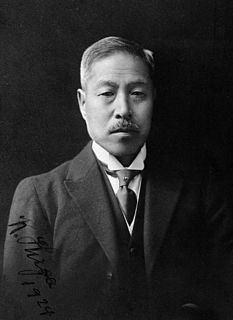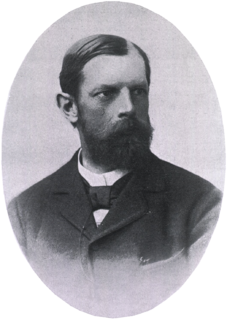Related Research Articles

Theodor Escherich was a German-Austrian pediatrician and a professor at universities in Graz and Vienna. He discovered and described the bacterium Escherichia coli.

Victor Babeș was a Romanian physician, bacteriologist, academician and professor. One of the founders of modern microbiology, Victor Babeș is author of one of the first treatises of bacteriology in the world – Bacteria and their role in pathological anatomy and histology of infectious diseases, written in collaboration with French scientist Victor André Cornil in 1885. In 1888, Babeș underlies the principle of passive immunity, and a few years later enunciates the principle of antibiosis. He made early and significant contributions to the study of rabies, leprosy, diphtheria, tuberculosis and other infectious diseases. He also discovered more than 50 unknown germs and foresaw new methods of staining bacteria and fungi. Victor Babeș introduced rabies vaccination and founded serotherapy in Romania.

Karl Peter Wilhelm Maurenbrecher was a German historian.

Kiyoshi Shiga was a Japanese physician and bacteriologist. He had a well-rounded education and career that lead to many scientific discoveries. In 1897, Shiga was credited with the discovery and identification of the Shigelladysenteriae microorganism which causes dysentery, and the Shiga toxin which is produced by the bacteria. He conducted research on other diseases such as tuberculosis and trypanosomiasis, and made many advancements in bacteriology and immunology.

Julius Richard Petri was a German microbiologist who is generally credited with inventing the device known as the Petri dish, which is named after him, while working as assistant to bacteriologist Robert Koch.

Johann Friedrich Dieffenbach was a German surgeon. He was born in Königsberg and died in Berlin.

Carl Ferdinand von Roemer, German geologist, had originally been educated for the legal profession at Göttingen, but became interested in geology, and abandoning law in 1840, studied science at the University of Berlin, where he graduated Ph.D. in 1842.

Ernst Zitelmann [tsi:tlman] was a German jurist who specialized in the dogmatics of civil law.
Johann Friedrich Wilhelm Krause was a German anatomist born in Hanover. He was the son of anatomist Karl Friedrich Theodor Krause (1797-1868).
Erich Hoffmann was a German dermatologist who was a native of Witzmitz, Pomerania.

Wilhelm Bölsche was a German author, editor and publicist. He was among the early promoters of nature conservation and committed to popularizing science.

Hans Ernst August Buchner was a German bacteriologist who was born and raised in Munich. He was the older brother of Eduard Buchner (1860–1917), winner of the 1907 Nobel Prize in Chemistry.

Carl Georg Friedrich Wilhelm Flügge was a German bacteriologist and hygienist. His finding that pathogens were present in expiratory droplets large enough to settle around an individual, the eponymous Flügge droplets, laid ground for the concept of droplet transmission as a route for the spread of respiratory infectious diseases.

Franz Boll was a German physiologist and histologist. He was the son of Lutheran theologian Franz Boll (1805–1875).
Emmy Klieneberger-Nobel was a German Jewish microbiologist and a founder of mycoplasma bacterial research. She performed most of her research at the Lister Institute in London, England, after having been expelled from Germany by the Nazis.
Wilfried Paul Feldenkirchen was a German professor and economic historian.

Johann Friedrich Bernhard Fischer was a German bacteriologist noted for his classification system for bacteria.

Benno Erdmann was a German neo-Kantian philosopher, logician, psychologist and scholar of Immanuel Kant.
Paul Trendelenburg was a German pharmacologist.
Siegfried Sudhaus was a German classical philologist, known for his scholarly treatment of Menander and Philodemus.
References
- Walther Kruse @ Who Named It
- Alfred W. Crosby (2003). America's Forgotten Pandemic. Cambridge University Press. ISBN 0-521-54175-1.